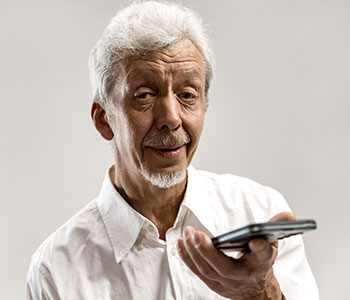Call Now To Schedule A Complimentary 15-minute Phone Consultation (248) 220-6085

The COVID-19 pandemic continues to spread across America and disrupt day to day lives. Those who are age 65 or higher experience a higher virus fatality rate, and the Centers for Disease Control and Prevention (CDC) continue to recommend that older adults stay at home as much as possible, especially those with underlying health conditions.
While at home, in senior living facilities and communities, the recommendations are for remaining largely isolated and keeping physical contact with other people to a bare minimum. For those seniors in nursing homes and assisted living facilities, the Centers for Medicare and Medicaid Services (CMS) have put restrictions in place that pause group activities, communal meals, and prohibit all guests, including family, from visiting residents.
Seniors who struggle to adapt to the internet of things (IoT) using digital devices that require typing, clicking, or swiping can now rely on voice commands to get the information they need and the people with whom they want to communicate. AARP and Voicebot.ai indicate an increase in the use of voice-first technology among seniors. Instead of learning how to navigate programs, apps, or websites, seniors can talk to a smart speaker to get what they need from family, necessary health providers, and other goods and services.
Social distancing protocols have made daily communication more essential than ever for senior life. Regular human connection via voice is critical to physical health, via telehealth medical professionals, but also for mental health, such as keeping in touch with loved ones and accessing the services and data that maintains a senior’s independence. Voice assistant technology like Alexa, Google Assistant, and Siri is available through many smart speakers. Wired recommends the eight best speakers currently on the market to connect to voice assistant technology.
Voice first technology, and the instant access it provides, allows a senior to communicate more information faster. According to McKnight’s Senior Living, the average human speech is 140 words per minute (wpm), while typing is 40 wpm and texting 24 wpm. The current accuracy rate of a smart speaker is about 95 percent, which is on par with a human. Therefore, a senior can accurately voice their needs or request for information faster and easier than ever before.
A smart speaker can act as a speakerphone when your senior takes incoming calls from friends and family and can also generate outgoing phone calls by simply voicing the command to call a specific person or service. Though most smart speakers are not able to call 911, they can call a family member or medical provider who can then reach 911 for the senior’s assistance.
Health care through telemedicine coverage via CMS has been expanded, relaxing patient health information confidentiality rules. Telemedicine services allow a senior to virtually consult with their doctors and health professionals while maintaining social distance. A senior can receive the medical advice and care they need by voice consultation through a smart speaker.
A smart speaker can also provide a wealth of activities for a senior like listening to music or audiobooks, learning about birds or flowers outside their window, or programs for doing gentle chair stretching. A senior can get the latest news and weather reports for their area or have groceries or prepared food delivered to their home.
Another benefit to voice-first technology is the bypassing of other required senses like sight and touch. Many older adults experience mobility issues and visual impairments. The CDC National Health Interview Survey finds that 51 percent of adults 65 or more have either vision problems, mobility problems, or both. Voice first technology eliminates barriers for these older adults. The usability problems created by small screens and keyboard difficulties, as well as physical distance from devices, vanish with the use of voice technology.
Industry consumer studies show that 52 percent of Americans age 55 or more say the number one reason they use voice-activated speakers is to become empowered and instantly get answers and information coupled with ease of use. Embracing voice-first technology can provide the connections a senior requires more personally, quicker, and easier than ever before. A smart speaker in a senior’s home can enable them to remain independent with functions of daily life at a time when maintaining social distance is crucial to their health and well-being.
We are using video technology for our meetings so we can continue to help with planning needs of our community. If you have questions or would like to discuss planning for yourself or a loved one, please contact our Clarkston, MI office at (248) 220-6085.